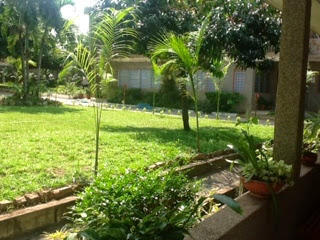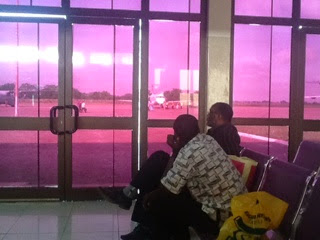Water is life!
Jim and I are about an hour outside of New York. We've now been gone 13 & 12 days respectively. I think JIm's time at the PCUSA Ghana Network meeting in Ho was worthwhile based on his recap and stories he told me yesterday.
Water is a problem!
I woke up on the plane a little earlier than everyone else on starting to get back into "real life mode". It's a difficult process because you start to think about people like Rev Solomon the Presby Chairperson for Tamale (I had dinner at his house on Wednesday night in Tamale). Rev Solomon is in real life mode every day. Tamale is 40% Christian and 60% Muslim - It's not Christians vs Muslims in the north of Ghana. People like Rev Solomon and Dan Kobilla are working hand in hand with their Muslim brothers and sisters to take on the bigger challenges of life - water, health, education, commerce, and so on.
It would be easy to make a judegement about Rev Solomon - what he wears, his quite demeanor, etc. - until you pull all the pieces together around Rev Solomon and understand he has his Phd and he converted from Muslim to Christanity and he is on one of the tughest Presbys in all of Ghana.
Tamale is uncomfortable. Driving the highway to Bogla is uncomfortable. Walking into a village and being surrounded by 30 kids is uncomfortable. Knowing that the 30 kids will not have access to rain water for 6 months is uncomfortable. Wondering if we will get back to Tamale before dark is uncomfortable.
Rev Solomon is about 6'4" with the body mass % we all wished we had. He speaks with a soft raspy tone - when he speaks. He listens.
Rev Solomon probably didn't ask to go to the north and be the Presby Chair in Tamale. There are probably better Presbys in Ghana - easier (relative) - less problems (relative) - more help (relative) - closer step to his next position in the PCG.
Rev Solomon was put in Tamale for a reason - he needs to be there. It's probably a challenge for Rev Solomon emotionally and physically. It's probably uncomfortable for Rev Solomon.
But - the other night when Rev Solomon did speak in the context of a discussion with the South African missionaries that were in Tamale to evangelize Christianity in the remote villages - there was a pause in the dialogue and Rev Solomon in his quiet raspy voice his eyes staring to the ceiling said...."God calls us sometimes to be uncomfortable".
For 4 days now this phrase has been in my thoughts.
Water solution.
The water problem in Ghana is not going to be solved in my lifetime. There are just too many issues - access, distribution, trust, quality, scale of the problems, and so on. This is a generational problem. The people of Ghana that don't have "ready" access to clean and trustworthy water just "figure it out" and that could mean doing without or compromising or drinking out of desperation. The people that have only access to ground water or untested bore water make the decision between thirst or diarhea; thirst or Guinea Worm; thirst or life.
It's uncomfortable to be at a school and see outside the class room a plastic trash can full of water and a cup on top of the lid and realize that that is the cup and water for the 60 kids in the class room AND really uncomfortble when the asst principal says their goal is to someday have the ability for every child to have their own cup!
It's basic. It's about 60 cups. It's about where to put those cups. It's about where to get reuseable cups. It's about how to keep those cups clean.
The bucket of water - that's problem #2.
Is the water problem in Ghana greater than the homeless problem in America - I know of no scale to even begin to answer that question- is one harder than the other - I know of no rule to contemplate relative difficulty. Is one more unconfotable than the other - that's a personal feeling.
I think the answer is along the line - they are both circumstances and issues that we are called or even compelled to serve. I can't see either being solved in the remaining years of my lifetime. I don't see either being solved in my boys lifetime. However I do see hope, faith, and service as the tools and means to comfort an uncomfortable situation like water problems in Ghana and homeless in America.
Crisis
I think of Francis the chief medical person in the clinic in Kwahu Praso and his soft calm voice that welcomed us and then excused himself when the taxi showed with the severally ill man in the back seat.
Francis lives at the clinic and serves 600 people a week from the surroundng 108 villages.
The light at the maternity door stays on all night.
Triage is what Francis does - he (the clinic) doesn't have many medical solutions - the clinic is about determining severity of the problem - delivering a baby (low severity) - life threatening or extensive treatment the patient is off to Abitify (by taxi).
A day or two after visiting Kwahu Praso Clinic I asked Rev Daniel Opong-Wereko how long Francis would be at the clinic, i.e. would he be rotated out to another clinic at some point - Daniel's answer "..he will be there until he is taken by God."
The perspective of crisis.
Voice
We all have memories, people, things, etc. that we wish we could take with us throughout our whole life. A grandparent not living anymore to see a grandchild graduate from high school - a friendship that has gone the way of the wind - and so on.
I have those thoughts too. And here is another one for me...I wish that I had Rev Solomon by myside everyday so that as I travel through the rest of my life I'd hear his raspy voice from his tall perch speak to the situation just like he did when I met him and he said...
"Water is Life!"
And just like he did with the missionaries from South Africa...
"God calls us sometimes to be uncomfortable"
And in the same discussion Wednesday night...
"We have been blessed that Guinea Worm has not been found since 2008"
I'm listening....



















































